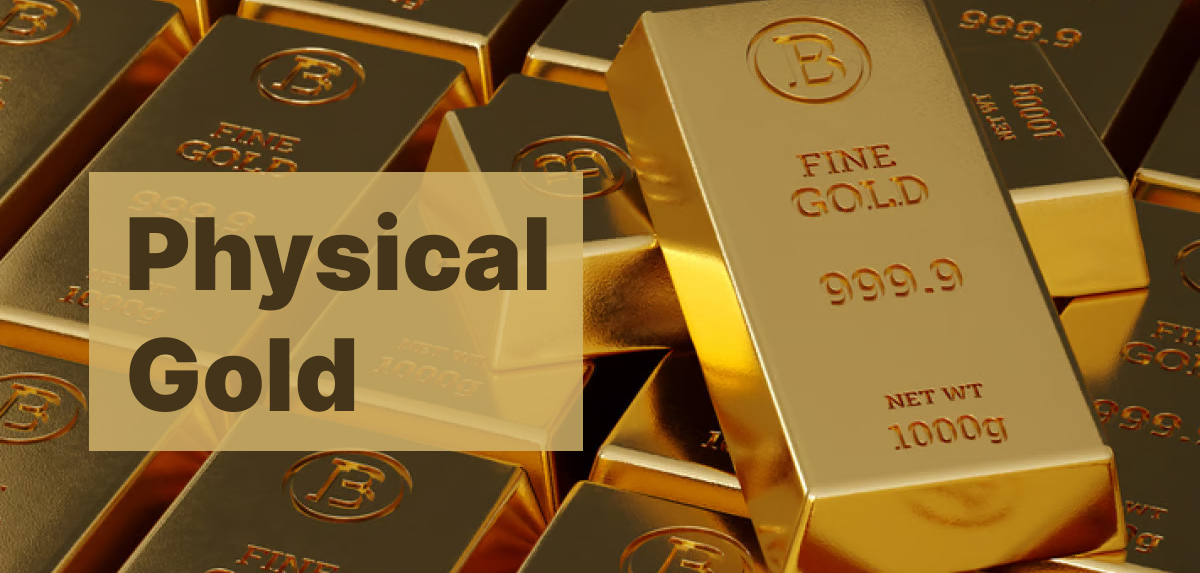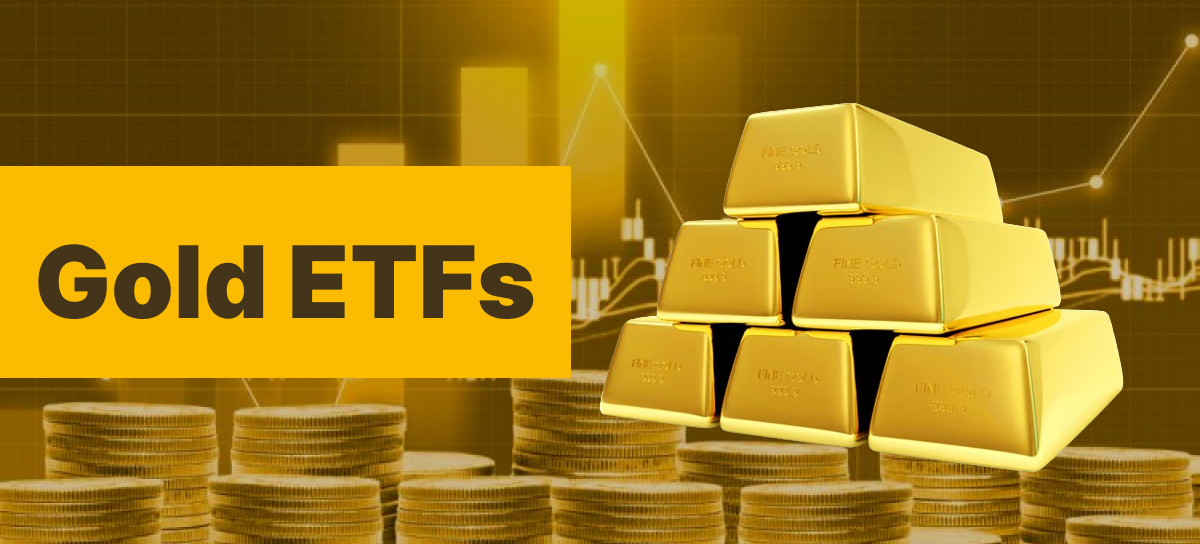Disclaimer: The companies mentioned in this report may offer compensation to us, without any charge to our readers. This is how we keep our reporting free for readers. Our selection of companies is determined by compensation and rigorous analysis.
Thinking about investing in gold but not sure whether you should go for Gold ETFs or Physical Gold?
Let’s break down the main differences between the two options for you, including accessibility, storage, liquidity, and costs.
We’re also going to dive into the pros and cons of both investments.
By the time we’re done, you’ll have a clearer picture of which option might be the right fit for you, taking into account factors like your investment horizon, risk tolerance, market trends, and personal preferences.
Our team has spent years researching every company in the precious metals industry. Save your time and use our research ⟶
Hand picked top 5 trusted and best reviewed companies
Protect Your Retirement
Claim Your FREE Gold Kit Now
What are Gold ETFs and Physical Gold?
If you’re looking to add some gold to your investment mix, you’ve got a couple of popular options to consider – Gold ETFs and physical gold. Gold ETFs bring you the perks of liquidity, easy trading, and lower transaction costs when compared to holding physical gold. With Gold ETFs, you don’t have to worry about storing the gold or setting up security measures, making it a convenient choice for many investors.
On the flip side, having physical gold in your hands gives you that direct ownership feel and a tangible asset that’s not tied to the financial system. A lot of folks view physical gold as a safeguard against inflation and currency ups and downs, giving their investment portfolio an extra layer of security.
How Do Gold ETFs and Physical Gold Differ?
Regarding gold investments, you’ve got two options to choose from: Gold ETFs and physical gold. They each have their own perks and quirks, so let’s break it down for you.
First off, Gold ETFs are all about convenience. You can easily dip your toes into the world of gold investments by buying shares, no vault required. On the flip side, if you opt for physical gold, get ready to figure out where to stash it safely.
But wait, there’s more. Gold ETFs are like the speedy Gonzales of the gold world when it comes to liquidity. You can buy or sell ’em on the stock exchange in a jiffy. Meanwhile, owning physical gold means taking on the responsibility of keeping it safe and sound. That means insurance, security, and all that jazz.
Lastly, let’s talk money. Gold ETFs often have lower costs since they’re traded like stocks. On the other hand, getting your hands on physical gold can involve extra expenses like transportation, insurance, and finding a secure storage spot. So, pick your poison wisely!
1. Accessibility
When comparing gold ETFs and physical gold, you should consider accessibility as a crucial factor. Gold ETFs make it super easy for you to get into gold since you can trade shares on stock exchanges, giving you ownership of the gold without needing to worry about physically storing it.
You might find it handy to trade gold ETF shares because they work just like regular stocks – you can buy and sell them whenever you want, offering you flexibility and quick cash access. But if you prefer having physical gold in your hands, it gives you something tangible that adds a layer of security and stability to your investment portfolio.
Even though ETFs are convenient and cost-effective, physical gold is more appealing to folks looking to hedge against economic uncertainties and inflation. Both options are designed to suit different investor tastes, giving you accessibility and a wide range of investment choices in the gold market.
2. Storage and Security
When you’re comparing gold ETFs and physical gold, storage and security considerations will be different for each. If you’re into gold ETFs, you don’t have to stress about storing those shiny bars physically. But, if you’re all about physical gold, you must make sure to keep your precious assets safe and sound.
If you’re an investor in gold ETFs, you get the perk of owning gold without the hassle, thanks to those shares traded on stock exchanges. No need to worry about locking up your gold in a safe.
But, if you’re more of a physical gold kind of person, you’re the one responsible for protecting your bullion from any sticky fingers or accidents. It’s pretty clear that these two types of investments have different storage needs. Gold ETFs are the easy-peasy, accessible way to get in on the gold game without the storage headache.
3. Liquidity
Regarding gold investments, you’ll find a big difference in liquidity between gold ETFs and physical gold. With gold ETFs, you get that quick and easy trading action, just like buying and selling stocks. This makes it super convenient for you to jump in and out of gold investments whenever you want.
Trading gold ETFs is like having a fast lane for your transactions. It’s smooth and efficient, drawing in both short-term traders and long-haul investors. But if you’re dealing with physical gold, be prepared for a slower ride. Buying and selling the real stuff takes more time and effort since you have to hunt down a buyer or seller on your own. This can lead to some frustrating delays in getting deals done.
Having that liquidity in gold ETFs is a game-changer for your investment game plan. It lets you react quickly to market shifts, seizing opportunities for profit or dialing down your risks in a flash. So, if you’re looking for flexibility and speed in your gold investments, those gold ETFs might be just what you need to keep your money moving.
4. Costs
When deciding between gold ETFs and physical gold, you’ve got to keep costs in mind. If you’re thinking about gold ETFs, watch out for those management fees that fund managers charge for looking after your investment. There might also be some transaction costs when you’re buying or selling ETF units.
Now, if you’re into owning physical gold, get ready to shell out for secure storage facilities and insurance to keep your precious assets safe. And when it comes time to sell, consider market prices and any fees that might come with the sale. Knowing about these cost factors is key for you to make smart decisions based on your financial goals and risk tolerance.
What Are the Advantages of Investing in Gold ETFs?
When you invest in gold ETFs, you open yourself up to a world of benefits. It’s a smart move for diversifying your investment portfolio, tapping into potential returns linked to gold prices, and even scoring some tax benefits if you’re in it for the long haul.
Gold ETFs are like the cheat code for getting in on the gold action without needing to physically own the stuff. They’re super convenient and cost-effective. By putting your money into gold ETFs, you can easily keep an eye on how the precious metal is doing, which adds a layer of transparency and liquidity to your investment.
Plus, since gold ETFs are traded on stock exchanges, they’re crazy accessible. You can buy or sell your holdings whenever you want throughout the trading day. It’s like having the Midas touch right at your fingertips.
What Are the Advantages of Investing in Physical Gold?
When you invest in physical gold, you’re getting some solid perks like having something you can actually hold onto, a safe haven during economic ups and downs, and a long-standing value recognized by those big-shot central banks and governments.
Having physical gold in your possession gives you a sense of security, especially when financial markets are going haywire.

It’s like having a lifeline that stays steady even when everything else is in chaos. In times of trouble or when prices are skyrocketing, gold has always been the safe choice, keeping your wealth and buying power intact.
The fact that gold has its own intrinsic value and there’s only so much of it out there, makes it a reliable way to store your wealth. Plus, its price tends to move in the opposite direction of the stock market, giving your investment portfolio that much-needed diversification. And let’s not forget the historical glam of gold as a symbol of wealth, power, and luxury – it’s like having a piece of timeless elegance in your investment mix.
What Are the Risks of Investing in Gold ETFs?
When you’re thinking about investing in gold ETFs, keep in mind that there are some risks you should consider. You might be exposed to company performance, market trends that affect gold prices, and there are fees associated with trading ETFs.
Gold ETFs can be a handy way for you to get into the world of precious metals without needing to physically own any.

But it’s important for you to be aware of the potential downsides too. You could run into company risks if the companies backing the ETF hit financial troubles or face operational issues, which could impact the value of the ETF.
Market ups and downs can also sway gold prices, causing fluctuations in ETF returns. And don’t forget about those fees – they can eat into your investment returns over time. Before you jump headfirst into gold ETF investments, take the time to do some thorough research and really think about these factors. It’ll help you make a smarter investment decision in the long run.
What Are the Risks of Investing in Physical Gold?
When you invest in physical gold, you’re getting into a game with some risks. Think about things like price swings that can drive you up the wall, returns that dance around with gold prices, the headache of finding a safe spot to store your shiny stuff, and the possibility of facing tax issues when you cash in on your gold assets.
The price of gold can be a wild ride, influenced by a ton of global economic factors that can mess with the value of your investment. Keeping your physical gold safe can be a real hassle, needing secure places like vaults or facilities that add extra costs and logistical headaches.
And don’t forget, the returns you get from physical gold are like the stock market’s yo-yo, going up and down with those market prices, leaving you guessing. Plus, when you decide to cash out on your gold, you might have to deal with taxes based on the gains you make, which could throw a curveball into your overall investment success.
Which is the Better Investment Option?
When you’re trying to figure out which investment is right for you – gold ETFs or physical gold – there are a few things to consider. Your investment goals, how much risk you’re comfortable with, current market trends, and your personal preferences all come into play.

If you’re all about having easy access to your investment and want something that’s easy to trade, you might lean towards gold ETFs. These bad boys are traded on the stock exchange just like any other stock, so you can quickly jump into the market without having to worry about storing physical gold.
But if you’re more into having something you can touch and feel, and you want that sense of security that comes with physically owning gold, then physical gold might be more your style. With physical gold, you have direct ownership of that shiny metal.
Don’t forget about market dynamics, though. ETF prices are affected by a bunch of different factors, while the price of physical gold usually reflects what’s happening with global demand and supply levels. So, keep that in mind when you’re making your decision.
1. Short-term vs. Long-term Investment
When you’re figuring out whether to go for gold ETFs or physical gold, it’s all about looking at your short-term and long-term investment goals. If you’re thinking short-term, gold ETFs might be your jam. They’re great for quick trading, and you can easily buy and sell them on the stock exchange. So, if you’re into capitalizing on market fluctuations or playing the price game, ETFs are the way to go.

On the other hand, if you’re in it for the long haul, physical gold like bars or coins could be your golden ticket. Sure, it might need safe storage and could come with higher transaction costs, but it’s perfect for long-term investors who want to diversify their assets and preserve their wealth.
To pick the best option for you, make sure you understand your investment goals and how much risk you’re willing to take. That way, you can choose between gold ETFs and physical gold with confidence.
2. Risk Tolerance
When deciding between gold ETFs and physical gold, you should think about your risk tolerance. If you’re cool with taking on more risk for the chance of bigger rewards, then gold ETFs might be your jam. But if you’re all about stability and playing it safe, physical gold could be more your speed. Having a higher risk tolerance usually means you’re okay with riding out some ups and downs in the market to potentially score bigger profits.
That’s where gold ETFs come in handy. On the flip side, if you’re not so keen on risk and want something you can hold in your hand, physical gold might be more up your alley. Understanding how your risk tolerance plays into your investment choices can help you tailor your approach to match both your potential returns and your comfort level for the long haul.
3. Market Trends
Monitoring market trends is crucial for your gold ETFs and physical gold investments. Watch those real-time price movements, trading volumes, and market dynamics because they can really shake things up for both of your investment options.
When you stay in the loop with market trends, you can make smart decisions based on what’s happening right now. By checking out price trends, trading volumes, and global economic factors, you’ll get a better idea of when to buy, sell, or hang on to your gold assets.
Watching market trends in real-time gives you the power to act fast when the market suddenly flips, so you can grab those profitable chances and dodge those risks. This proactive approach to tracking market trends is key for squeezing out the best returns and handling risk like a pro in the world of gold investments.
4. Personal Preferences
Regarding deciding between gold ETFs and physical gold, you need to consider your own preferences. Some people might prefer the ease and expertise of ETF investments, while others enjoy the hands-on experience of physical gold and don’t want to deal with commission charges.
Before you make your decision, it’s important to think about a few things. Getting advice from experts is a smart move, as they can give you valuable insights into market trends and the risks involved with each investment option. Cost is another big factor to think about – ETFs might be cheaper than buying and storing physical gold.
In the end, it’s all about aligning your investment strategy with what you personally prefer and your financial goals. This will help you navigate the choice between gold ETFs and physical gold more confidently.
Protect Your Retirement
Claim Your FREE Gold Kit Now

I’m Bob Smithfield, your guide to making smart, safe investments. Here, I share financial insights and strategies that help you navigate the complex world of finance with confidence.
My goal is to provide you with the information and tools you need to make informed decisions about your finances.
